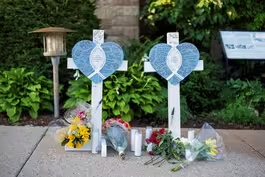
'Public health is in trouble,' says former CDC official
Clip: 8/28/2025 | 7m 14sVideo has Closed Captions
'Public health is in trouble,' says high-ranking CDC leader who resigned in protest
There are serious concerns about the Centers for Disease Control and its mission after Susan Monarez was suddenly fired from her position as director. She had refused to resign amid clashes with Health Secretary Robert F. Kennedy Jr. over vaccine policy. Her dismissal set off a wave of resignations, including chief medical officer Dr. Debra Houry, who joined Amna Nawaz to discuss the developments.
Problems playing video? | Closed Captioning Feedback
Problems playing video? | Closed Captioning Feedback
Major corporate funding for the PBS News Hour is provided by BDO, BNSF, Consumer Cellular, American Cruise Lines, and Raymond James. Funding for the PBS NewsHour Weekend is provided by...

'Public health is in trouble,' says former CDC official
Clip: 8/28/2025 | 7m 14sVideo has Closed Captions
There are serious concerns about the Centers for Disease Control and its mission after Susan Monarez was suddenly fired from her position as director. She had refused to resign amid clashes with Health Secretary Robert F. Kennedy Jr. over vaccine policy. Her dismissal set off a wave of resignations, including chief medical officer Dr. Debra Houry, who joined Amna Nawaz to discuss the developments.
Problems playing video? | Closed Captioning Feedback
How to Watch PBS News Hour
PBS News Hour is available to stream on pbs.org and the free PBS App, available on iPhone, Apple TV, Android TV, Android smartphones, Amazon Fire TV, Amazon Fire Tablet, Roku, Samsung Smart TV, and Vizio.
Providing Support for PBS.org
Learn Moreabout PBS online sponsorshipGEOFF BENNETT: Welcome to the "News Hour."
There are serious concerns tonight about the Centers for Disease Control and its mission after Director Susan Monarez was suddenly fired from her position on Wednesday.
She had refused to resign amid clashes with Health Secretary Robert F. Kennedy Jr. over vaccine policy.
AMNA NAWAZ: Monarez, an infectious disease researcher, was sworn in less than a month ago and had quickly clashed with Kennedy over the handling of the agency.
In a statement, her lawyers said -- quote - - "When she refused to rubber-stamp unscientific reckless directives and fire dedicated health experts, she chose protecting the public over serving a political agenda.
For that, she's been targeted."
Her dismissal set off a wave of resignations, with several other senior CDC officials stepping down in protest.
That includes the chief medical officer, Dr. Debra Houry, who was met with applause and hugs from supporters and staff outside the CDC building today.
And Dr. Houry joins me now from Atlanta.
Welcome to the program.
Thanks for joining us.
DR. DEBRA HOURY, Former CDC Chief Medical Officer: Thanks for having me.
AMNA NAWAZ: So let's just start with your decision.
Why did you feel the need to resign?
DR. DEBRA HOURY: It was such a tough decision.
I love the CDC.
The work we do is so important.
But I had just felt we had reached a tipping point when it came to our science and our data and being able to do the work we needed to do.
I was concerned about the future of CDC and my ability to be a leader at the CDC and to do what was needed to be done on the inside.
I thought my voice and the voice of my colleagues that also resigned with me would be more powerful on the outside.
AMNA NAWAZ: What does reaching that tipping point, as you put it, mean to you?
You saw Dr. Monarez's lawyers reference the unscientific and reckless directives.
What does that mean to you?
DR. DEBRA HOURY: Yes, so we have an immunization committee meeting coming up in a few weeks.
And many of us, myself included, were concerned about some of the recommendations might walk back vaccines in our country.
To me, that's one of the tipping points.
I think another tipping point is just the loss of Dr. Monarez.
We hadn't had a CDC director for several months.
When she came on board, she brought scientific rigor and some new ideas around public comment and how to really make sure data drove the decisions.
When she had done some of these changes, she was brought to the secretary's office for discussion.
And, at that point, I became concerned that she wouldn't be able to implement changes that were needed at CDC, and without that leadership, it would just leave us vulnerable again.
And I thought that was the point to say, enough is enough and to really raise that Bat Signal that public health and CDC is in trouble.
AMNA NAWAZ: You have also said previously that her firing makes it easier for Secretary Kennedy's appointees to change vaccine recommendations.
You just mentioned fearing a walk-back in some of those vaccine policies.
What does that mean specifically?
What could we see ahead?
DR. DEBRA HOURY: So, if we don't have a CDC director, and if there's not an acting CDC director, then the secretary would sign recommendations like he did for the last ACIP, or vaccine committee, meeting.
So things like the COVID vaccine or hepatitis B vaccine, they could choose to change ages on it or the populations that have access to it.
I'm just concerned about changing vaccine access in our country and that we need to focus more on the safety and effectiveness of vaccines, shared decision-making around vaccines, and not talking about misinformation around vaccines.
AMNA NAWAZ: And changes to things like the hepatitis B vaccine, are those conversations you were a part of during your time there?
Those are being discussed?
DR. DEBRA HOURY: So I know that the work groups have been asked to look at hepatitis B.
They're in the middle of pulling a systematic review together right now.
So I would imagine that means they will be discussed.
My concern is, we have pulled evidence reviews together before for the ACIP meetings, that we had one that was pulled down and not discussed.
I think it's really important when we do work at CDC for our data, our science and our evidence reviews to be publicly posted, so the public can also review them and understand.
And, to me, that is transparency and something we were trying to move towards, particularly with the secretary's commitment to radical transparency.
That would mean having publicly available data and documents.
AMNA NAWAZ: The White House Press secretary, Karoline Leavitt, asked about Dr. Monarez's firing today and your resignation, among others.
Here's what she said in response.
KAROLINE LEAVITT, White House Press Secretary: I understand there were a few other individuals who resigned after the firing of Ms. Monarez.
One of those individuals wrote in his departure statement that he identifies pregnant women as pregnant people.
So that's not someone who we want in this administration anyway.
So if people are not aligned with the president's vision and the secretary's vision to make our country healthy again, then we will gladly show them the door.
AMNA NAWAZ: Dr. Houry, any administration would argue that they should be able to staff it with people who will help them to see through their mission.
So what's different about this?
What would you say to that?
DR. DEBRA HOURY: So I served under the prior Trump administration.
And I can tell you, I was able to brief the secretary and the assistant secretary.
None of our senior scientists or senior careerists have briefed the secretary on things like measles or H5N1 or vaccines.
So, to me, that's concerning.
Certainly, administrations have priorities.
And my goal is not to judge what the priorities are, but to help the administration implement those priorities, as long as they follow science and data.
I think what we have seen an issue is that this is less on politics and more on ideology.
I really believe that, if we can follow data, science, have more involvement of the public, that we would increase the trust.
I think when there's talks around, don't trust the experts, as the secretary recently said, that doesn't help build trust in the work we are doing.
AMNA NAWAZ: I should also note it was just earlier this month that the CDC headquarters in Atlanta was attacked by a gunman who was angry about COVID vaccines, fired nearly 200 shots, damaged six buildings, killed a police officer.
How did that impact your team?
What's it been like to work there since then?
DR. DEBRA HOURY: So -- and first I just want to acknowledge Officer David Rose, who gave his life to save my colleagues' lives.
I can tell you, it was very traumatic for many of our staff.
I spoke to people in conference rooms that night until about 11:30 p.m. at night, FaceTiming them, calling them, trying to offer support, because they didn't know what was happening.
They'd heard the shots.
I had several staff that were at the day care picking up their children that laid across their children to protect them.
I can't imagine going through that.
So, of course, now there's mental health consequences and longer mental health trauma from that.
They are concerned, if they talk about things like vaccines or things that might have scientific controversy, that violence could be inflicted towards them.
So it's had a significant impact on our staff.
AMNA NAWAZ: That is Dr. Debra Houry, the former chief medical officer from the CDC, joining us tonight.
Dr. Houry, thank you for your time.
DR. DEBRA HOURY: Thank you.
AMNA NAWAZ: And the White House has reportedly selected Robert F. Kennedy Jr.'s deputy, Jim O'Neill, to serve as acting head of the CDC.
Katrina's lasting impact and concerns over future storms
Video has Closed Captions
Clip: 8/28/2025 | 9m 43s | 20 years later, a look at Katrina's lasting impact and concerns over future storms (9m 43s)
Man speaks after wife's ICE detention led to hospitalization
Video has Closed Captions
Clip: 8/28/2025 | 7m 2s | 'We felt ambushed,' man says after wife's ICE detention led to hospitalization (7m 2s)
Minneapolis mourns lives lost in Catholic school shooting
Video has Closed Captions
Clip: 8/28/2025 | 7m 12s | Minneapolis mourns 2 children killed in Catholic school shooting (7m 12s)
News Wrap: Russian drone attack on Kyiv kills at least 18
Video has Closed Captions
Clip: 8/28/2025 | 8m | News Wrap: Russian drone attack on Kyiv kills at least 18 (8m)
N.H. arts groups face budget blow as state slashes funding
Video has Closed Captions
Clip: 8/28/2025 | 7m 49s | New Hampshire arts groups face double budget blow as state slashes funding (7m 49s)
Why European countries want to reimpose sanctions on Iran
Video has Closed Captions
Clip: 8/28/2025 | 5m 30s | Why European countries want to reimpose harsh sanctions on Iran (5m 30s)
Providing Support for PBS.org
Learn Moreabout PBS online sponsorshipSupport for PBS provided by:
Major corporate funding for the PBS News Hour is provided by BDO, BNSF, Consumer Cellular, American Cruise Lines, and Raymond James. Funding for the PBS NewsHour Weekend is provided by...

















